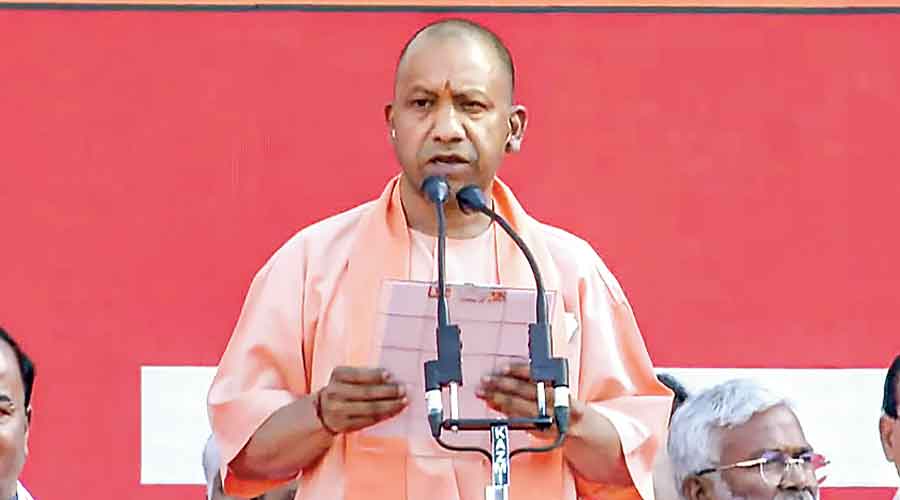Uttar Pradesh Chief Minister Yogi Adityanath has directed the state police to run a special campaign for the safety of girls and activate anti-Romeo squads from Saturday, the first day of Navratras, a senior official said.
Additional Chief Secretary (information) Navneet Sehgal on Friday said the Mission Shakti will also start on April 10.
Anti-Romeo squads were formed soon after Yogi Adityanath assumed the office of the chief minister in Uttar Pradesh in 2017.
Dressed in plain clothes, sleuths are generally deployed at public places like colleges, shopping malls, markets, parks, bus stands, railway stations and schools to "protect" women.
The Mission Shakti focuses on ensuring the safety and dignity of women and girls.
Sehgal said, "From the first day of Navratras, the Police Department will start a special campaign pertaining to women's safety. Anti-Romeo squads will be activated near schools and colleges."
"In the evening, police will undertake patrolling in busy markets and crowded places," he added, stressing that the Mission Shakti will begin on April 10.
Meanwhile, an official spokesperson said the chief minister has directed the state's Home Department to expedite fixing priorities for the government's 100-day plan.
Adityanath has directed the Police Department to ensure that at least 10,000 policemen are inducted in 100 days.
Instructions were also issued at the Thursday late night review meeting of the Home Department to initiate tough action against criminals, seize or destroy their illegal properties.
The CM also laid emphasis on co-ordination among the intelligence department, STF and ATS.
Instructions were issued to identify top 10 criminals in every police station area.
UP govt enforces strict regulatory system to prevent Q-paper leaks: Officials
In a bid to ensure that no question papers of the state's school examination board are leaked, the Education Department has enforced a strict regulatory regime for strong rooms stocking papers across the state.
The regulatory commands range from surprise physical checks of strong rooms to limiting visitors to them and putting a complete ban on the use of mobile phones by staff manning or visiting them, an official said on Friday.
The additional measures were implemented following the recent leaks of class 12 board exam papers that led to the cancellation of examinations in 24 districts across the state.
While the investigation of the incident is underway and over 34 suspects have been arrested so far, Chief Minister Yogi Adityanath has ordered invoking the National Security Act (NSA) against those involved in the leakage.
In the Ballia district, where the question papers were leaked, senior officials, including the district magistrate and superintendent of police, are personally reviewing the arrangements put in place to prevent the leakage.
"Concerned officials in the district have been asked to strictly monitor strong rooms where the board exam papers are kept. At exam centres, the officers have been asked to ensure that the entry into the strong rooms is strictly regulated and details of everyone entering it are registered in a log book," Joint Director (Education) Yogendra Kumar Singh of Azamgarh Division told PTI on Friday.
The officer had on Thursday personally inspected the district level board exam control room set up at the office of Ballia's chief development officer.
"The concerned officials have been asked to practice utmost strictness to ensure that no mobile device is allowed inside the strong room or locker room where the exam papers are kept. Absolutely no one is allowed to take a mobile phone inside that room," he said.
The Secondary Education Department, on the instructions of Uttar Pradesh Chief Secretary Durga Shankar Mishra, has directed district officials across Uttar Pradesh to exercise strict vigilance to prevent the leakage of board exam papers.
In a press statement on Thursday, Additional Chief Secretary (Secondary Education ) Aradhana Shukla had asked DMs and SPs to personally inspect exam papers and exam centres in their respective districts.
"The officers have been asked to inspect at least 20 per cent of the board exam papers to ensure that they are safely kept in strong rooms and not tampered with. The officers have also been asked to conduct a personal inspection of at least 20 per cent of exam centres in their districts," she had said.
Shukla and other officials of the Education Department are keeping a close watch on the exam proceedings from the state-level control room in Lucknow.
"We receive audio and video feed from the very exam rooms of every exam centre across the state at the state-level control room. A team of officials are keeping a close watch on the feed. We alert the concerned exam centres in real-time in case we notice any discrepancy or in case the audio feed from a particular centre is obstructed. This prevents the possibility of paper leak and the use of unfair means," she said.
A total of 27,81,654 class 10 students, including 15,53,198 boys and 12,28,456 girls, are taking exams this year. Similarly a total of 24,11,035 students, including 13,24,200 males and 10,86,835 females are writing the examination for class 12.
The state government has set up 8,373 exam centres across the state. Of these, 6,398 centres are in rural areas and 1,975 in urban areas. The state government has declared 861 exam centres as "sensitive", 254 "very sensitive" and 7,258 as "general".
All these exam centres are being monitored closely with help of staff and a total of 2,97,124 CCTV cameras, an official said, adding the feed of these cameras is being monitored at the state-level examination command centre, 75 district-level command centres and 8,373 centre-level command centres.











